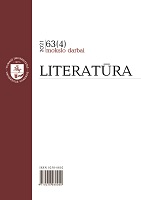Quelques réflexions autour des nouvelles d’exil de Jan Čep
Some Reflexions on Jan Čep’s Short Stories in Exile
Author(s): Samuel BidaudSubject(s): Czech Literature, Existentialism, WW II and following years (1940 - 1949), Post-Communist Transformation, Theory of Literature
Published by: Vilniaus Universiteto Leidykla
Keywords: Jan Čep; exile; later short stories; Czech literature; Christianism;
Summary/Abstract: This article focuses on the six short stories that the Czech writer Jan Čep wrote during his exile in France, when he fled the new Czechoslovak communist regime after 1948. These texts are as follows: Les Tziganes [The Gypsies], which was written in French and published in the journal Terre humaine in 1952, Tajemství Kláry Bendové [The Secret of Klára Benda], Před zavřenými dveřmi [In Front of the Closed Door],Ostrov Ré [Ré Island], Květnové dni [Days of May], and Tři pocestní [Three Pilgrims]. These short stories are interesting for several reasons. First of all, they present a changing point in Čep’s themes, for they take place during the more recent events – the Second World War and the arrival to power of the communist regime, – and evoke a humanity who has been destroyed. The existential drama of the individual, which had previously been predominant in Čep’s work, is now extended to the entire human community. Fear has separated people from each other, and every genuine personal relation has become impossible. What’s more, language is incapable of bringing together human beings. True communication implies a form of silence, in which God can speak to the heart of man, and where the possibility of communion with the others still exists. At the same time, Čep’s characters have to face this recent history, which obliges them to make a choice, in particular as far as exile is concerned. As a consequence, a new form of anguish appears, and is superimposed on Čep’s original one. It gives rise to a feeling of guilt over those who stayed in Czechoslovakia, especially his mother, but also confronts Čep with the inability to write, since he doesn’t manage to find a publisher in France and can no longer write in Czech. As a “pilgrim on the earth”, he endures his suffering and the suffering of the world united to Christ, in communion with Him. Eventually, these later short stories represent a transition for Čep, and reveal that he accepts, as painful as this decision can be, to abandon fiction and to engage in the genre of essay, above all for Radio Free Europe. He will thus manage to give hope to people who suffer behind the Iron Curtain in Czechoslovakia, while expressing his intimate concerns in a very personal way.
Journal: Literatūra
- Issue Year: 63/2021
- Issue No: 4
- Page Range: 8-24
- Page Count: 17
- Language: French

